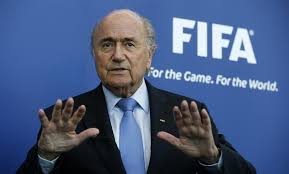By Andrew Warshaw
November 21 – Just days after Amnesty International’s explosive report into what it described as the endemic mistreatment of migrant workers in Qatar, FIFA president Sepp Blatter has wracked up the pressure on the Qatari authorities to ensure the safety of those working on 2022 World Cup projects.
After he met International Trade Union Confederation president Michael Sommer, the two organisations agreed that “fair working conditions must be introduced quickly, consistently and on a sustained basis in Qatar.”
Qatar has come under severe scrutiny over the conditions under which migrant workers are forced to operate. Last week, World Cup organisers, during a series of media briefings in Doha, stressed that firm plans were under way to reform the archaic kafala system which ties employees to specific “sponsor” employers.
Earlier this month Blatter met with the Emir of Qatar and other government officials in Doha but couched his words in diplomacy during a press conference immediately afterwards.
Not this time, the FIFA president calling for action sooner rather than later.
“Economic and political leaders must contribute to improving the unacceptable situation in Qatar,” said Blatter who was urged by Amnesty international at the weekend to intervene more meaningfully.
Sommer, who is from Germany, was joined at the meeting with Blatter by leading football officials from his country including German FA president Wolfgang Niersbach. “Qatar must guarantee the (International Labour Organisation’s) core labour standards and thus eliminate discrimination and forced labour as well as allow freedom of association for its 1.3 million migrant workers,” said Sommer.
The ITUC has warned that as many as 4,000 migrant workers could die in the build-up to 2022 and Germany, in particular, has taken a strong line over kafala. “The awarding of the World Cup and the considerable public exposure gives us the opportunity to point out irregularities and to exact lasting change,” said Niersbach. “If we succeed, then a lot will have been achieved. It was a matter of priority for us to quickly bring together the International Trade Union Confederation and FIFA as contractual partners for Qatar.”
However, Blatter did emphasise that he believed Qatar was taking the situation seriously and addressing the problem. In a statement he said: “Economic and political leaders must contribute to improving the unacceptable situation in Qatar. That is why I welcome the initiative shown by the DFB and ITUC because together we can achieve change. I am convinced that Qatar is taking the situation very seriously. These very discussions about Qatar show just what an important role football can play in generating publicity and thus bringing about change.”
FIFA has handed executive committee member Theo Zwanziger, also of Germany, the responsibility for liaising with the ITUC. Zwanziger is scheduled to report on Qatar at the March 20-21 FIFA executive committee meeting in Zurich.
Although football itself in Qatar has remained relatively free of human rights scrutiny, the case of French-Algerian player Zahir Belounis and his attempts to secure an exit visa has inevitably raised suspicions that other foreign players are suffering the same fate.
Zwanziger, who is reported to have been instrumental in brokering Wednesday’s talks, said: “The aim is to be in a position to report on concrete measures for Qatar at the executive committee meeting in March 2014. Large companies must be reminded of their duties in this area. The international community must also accept its responsibility.”
Contact the writer of this story at moc.l1745046284labto1745046284ofdlr1745046284owedi1745046284sni@w1745046284ahsra1745046284w.wer1745046284dna1745046284

